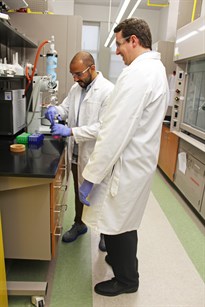 The research of Dr. Daniel Alge, assistant professor in the Department of Biomedical Engineering at Texas A&M University, has been featured on the cover of the ACS journal Biomacromolecules. Alge joined the faculty of Texas A&M in August 2014. In addition to his primary appointment in biomedical engineering, he has a courtesy appointment in materials science and engineering.
The research of Dr. Daniel Alge, assistant professor in the Department of Biomedical Engineering at Texas A&M University, has been featured on the cover of the ACS journal Biomacromolecules. Alge joined the faculty of Texas A&M in August 2014. In addition to his primary appointment in biomedical engineering, he has a courtesy appointment in materials science and engineering.
Alge and colleagues were recognized for their research paper describing an innovative method for synthesizing protein-functionalized hydrogel microparticles with tunable bioactive properties.
Protein functionalization is of general interest for imparting biological activity to synthetic materials, a key requirement for many biomedical applications. This is challenging because proteins are fragile and susceptible to damage during chemical synthesis. Alge’s group has overcome this challenge by using click chemistry, which encompasses a toolkit of high fidelity chemical reactions that are selective, efficient and proceed under mild conditions.
“Click chemistry offers numerous advantages for biomaterials synthesis,” said Alge.
Chief among these is better control over the physical and chemical properties of biomaterials that ultimately determine their performance.
Due to its advantages, click chemistry is currently an important topic in the biomaterials field. Alge’s paper is one of several on clickable biomaterials that have recently been published in Biomacromolecules and other leading journals. Their work is distinguished by the specific reactions they used.
“We want the methods and materials we develop to be broadly useful,” said Alge. “To ensure this, we have intentionally chosen click reactions that offer control but are also synthetically accessible and can be implemented on a larger scale.”
Alge envisions a number of applications for the biomaterials they are developing. A future goal of his lab is to engineer these microparticles, which can be injected into the body non-invasively, to guide the healing and regeneration of damaged tissues.
“A major goal in our lab is to develop enabling materials for regenerative medicine,” said Alge. “If we are able to translate our new method to therapeutic proteins like growth factors, it will constitute significant progress toward this goal and could lead to some important advances.”
For more information regarding the article, visit: http://pubs.acs.org/doi/abs/10.1021/acs.biomac.6b00990
For more information about Dr. Daniel Alge, visit: /biomedical/people/alge-daniel